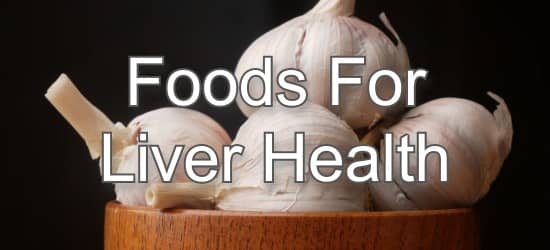The 10 Best Foods For A Healthy Liver

The liver is the largest organ of the body (besides the skin), weighing around 3 pounds (1.5 kg). The liver is in the upper right-hand side of the abdomen, and has more than 500 functions, some of which include:
- Processing the blood from the digestive system, which contains newly absorbed nutrients along with potential toxins
- Blood sugar control
- Immune function - helping to fight infections
- Removing harmful substances and toxins from the body
- Manufacturing bile (for fat digestion)
- Storage of vitamins, minerals and other essential substances
- Storing glycogen (an important energy source)
- Making and regulating the levels of certain hormones
- Making enzymes
- Regulating blood clotting
According to the U.S. Liver Foundation, 4.5 million Americans live with chronic liver disease, and over 30,000 die each year from liver disease (1).
Non-alcoholic fatty liver disease (NAFLD) is a growing problem worldwide, affecting 20-30% of adults (2). NAFLD refers to the accumulation of fat in the liver and has been described as the hepatic (relating to the liver) manifestation of metabolic syndrome. Metabolic syndrome is the collection of health factors (high blood pressure, high cholesterol, overweight etc.) resulting from the typical unhealthy Western diet and sedentary lifestyle. In other words, NAFLD is the result of our modern unhealthy lifestyles.
Even in the absence of the above conditions, if your liver is not functioning optimally, it can result in a host of problems due to its diverse functions; including low energy, hormone imbalances, and compromised immunity. Supporting liver function is therefore integral to our health and well-being.
A high-fiber whole-food diet is recommended for liver health. A diet rich in plant foods provides plenty of fiber, antioxidants, protective phytochemicals, vitamins, and minerals. Evidence suggests that the Mediterranean diet particularly benefits liver health (3,4). The Mediterranean diet consists of fruits, vegetables, whole grains, pulses, nuts, olive oil, fish, and small amounts of high-quality dairy and meat.
A healthy liver is important for detoxifying harmful substances, processing nutrients and fat, and regulating blood sugar levels. How can you help to support the healthy functioning of your liver? Check out these 10 healthy foods that are perfect for the job.
Foods for a Healthy Liver

Nutrition Facts for Dry Roasted Sunflower Seeds.

Nutrition Facts for Cooked Oatmeal.

Nutrition Facts for Kimchi.

Nutrition Facts for Ground Turmeric.

Nutrition Facts for Coffee.

Nutrition Facts for Walnuts.

Nutrition Facts for Cooked Spinach.

Nutrition Facts for Farmed Atlantic Salmon.

Nutrition Facts for Olive Oil.

Nutrition Facts for Garlic.
Tips for a Healthy Liver
Related
Data Sources and References
- Liver Disease by the Numbers - American Liver Foundation
- Wehmeyer MH, Zyriax BC, Jagemann B, Roth E, Windler E, Schulze Zur Wiesch J, Lohse AW, Kluwe J. IMPACT OF CURRENT DIET AT THE RISK OF NON-ALCOHOLIC FATTY LIVER DISEASE (NAFLD) Medicine (Baltimore). 2016 Jun;95(23):e3887. doi: 10.1097/MD.0000000000003887. 27281105
- Baratta F, Pastori D, Del Ben M. Effect of green-Mediterranean diet on intrahepatic fat: the DIRECT PLUS randomised controlled trial Hepatobiliary Surg Nutr. 2021 Oct;10(5):699-701. doi: 10.21037/hbsn-21-280. 34760978
- Abenavoli L, Di Renzo L, Boccuto L, Alwardat N, Gratteri S, De Lorenzo A. Alimentary regimen in non-alcoholic fatty liver disease: Mediterranean diet Expert Rev Gastroenterol Hepatol. 2018 Sep;12(9):873-881. doi: 10.1080/17474124.2018.1503947. Epub 2018 Aug 1. 30033779
- Zhao LG, Shu XO, Li HL, Zhang W, Gao J, Sun JW, Zheng W, Xiang YB. Vitamin intake and liver cancer risk: a report from two cohort studies in China J Epidemiol. 2017 Mar;27(3):89-97. doi: 10.1016/j.je.2016.10.002. Epub 2016 Dec 26. 28142039
- Askari F, Rashidkhani B, Hekmatdoost A. Tocotrienols for normalisation of hepatic echogenic response in nonalcoholic fatty liver: a randomised placebo-controlled clinical trial Nutr Res. 2014 Feb;34(2):143-8. doi: 10.1016/j.nutres.2013.11.005. Epub 2013 Dec 6. 24461315
- Dufour JF. Pioglitazone, vitamin E, or placebo for nonalcoholic steatohepatitis Hepatology. 2010 Aug;52(2):789-92. doi: 10.1002/hep.23817. 20683969
- Solga SF, Diehl AM. Synbiotic modulation of gut flora: effect on minimal hepatic encephalopathy in patients with cirrhosis Hepatology. 2004 May;39(5):1197-200. doi: 10.1002/hep.20220. 15122746
- Cesaro C, Tiso A, Del Prete A, Cariello R, Tuccillo C, Cotticelli G, Del Vecchio Blanco C, Loguercio C. Probiotics and liver disease Dig Liver Dis. 2011 Jun;43(6):431-8. doi: 10.1016/j.dld.2010.10.015. Epub 2010 Dec 16. 21163715
- Arab JP, Martin-Mateos RM, Shah VH. Gut microbiota and probiotics in chronic liver diseases Hepatol Int. 2018 Feb;12(Suppl 1):24-33. doi: 10.1007/s12072-017-9798-x. Epub 2017 May 26. 28550391
- Mittal VV, Sharma BC, Sharma P, Sarin SK. Effect of probiotic VSL#3 in the treatment of minimal hepatic encephalopathy: A non-inferiority randomized controlled trial Eur J Gastroenterol Hepatol. 2011 Aug;23(8):725-32. doi: 10.1097/MEG.0b013e32834696f5. 21646910
- Gao S, Duan X, Wang X, Dong D, Liu D, Li X, Sun G, Li B. Curcumin in Liver Diseases: A Systematic Review of the Cellular Mechanisms of Oxidative Stress and Clinical Perspective Food Chem Toxicol. 2013 Sep;59:739-47. doi: 10.1016/j.fct.2013.07.032. Epub 2013 Jul 18. 23871787
- Blaauw R, Labadarios D. Food and Nutrition in the Pathogenesis of Liver Damage SADJ. 2000 Jun;55(6):327-8. 12608273
- Rivera-Espinoza Y, Muriel P. Curcumin and liver disease Liver Int. 2009 Nov;29(10):1457-66. doi: 10.1111/j.1478-3231.2009.02086.x. 19811613
- Mirhafez SR, Farimani AR, Dehhabe M, Bidkhori M, Hariri M, Ghouchani BF, Abdollahi F. Effects of phytosomal curcumin on anthropometric parameters, insulin resistance, cortisolemia and non-alcoholic fatty liver disease indices: a double-blind, placebo-controlled clinical trial J Gastrointestin Liver Dis. 2019 Jun 1;28:183-189. doi: 10.15403/jgld-179. 31204416
- Yang K, Chen J, Zhang T, Yuan X, Ge A, Wang S, Xu H, Zeng L, Ge J. Efficacy of curcumin/turmeric on liver enzymes in patients with non-alcoholic fatty liver disease: A systematic review of randomized controlled trials Front Immunol. 2022 Sep 9;13:949746. doi: 10.3389/fimmu.2022.949746. eCollection 2022. 36159792
- Yang K, Chen J, Zhang T, Yuan X, Ge A, Wang S, Xu H, Zeng L, Ge J. The effects of curcumin supplementation on liver function, metabolic profile and body composition in patients with non-alcoholic fatty liver disease: A systematic review and meta-analysis of randomized controlled trials Front Immunol. 2022 Sep 9;13:949746. doi: 10.3389/fimmu.2022.949746. eCollection 2022. 36159792
- Panahi Y, Kianpour P, Mohtashami R, Jafari R, Simental-Mendía LE, Sahebkar A. Treatment of Non-alcoholic Fatty Liver Disease with Curcumin: A Randomized Placebo-controlled Trial Drug Res (Stuttg). 2017 Apr;67(4):244-251. doi: 10.1055/s-0043-100019. Epub 2017 Feb 3. 28158893
- Darvesh AS, Bishayee A. Curcumin and liver cancer: a review Anticancer Agents Med Chem. 2010 May;10(4):338-45. doi: 10.2174/187152010791162252. 20380634
- Szántová M, ?urkovi?ová Z. Coffee and liver health Vnitr Lek. 2016 Winter;62(12):990-997. 28139128
- Morisco F, Lembo V, Mazzone G, Camera S, Caporaso N. [Coffee can be beneficial for patients with liver diseases] J Clin Gastroenterol. 2014 Nov-Dec;48 Suppl 1:S87-90. doi: 10.1097/MCG.0000000000000240. 25291138
- Morisco F, Lembo V, Mazzone G, Camera S, Caporaso N. [Coffee as hepatoprotective factor] J Clin Gastroenterol. 2014 Nov-Dec;48 Suppl 1:S87-90. doi: 10.1097/MCG.0000000000000240. 25291138
- Shapiro H, Bruck R. Coffee and tea consumption are associated with a lower incidence of chronic liver disease in the United States Gastroenterology. 2006 May;130(6):1931-2; author reply 1932. doi: 10.1053/j.gastro.2006.03.035. 16697765
- Chen BB, Han Y, Pan X, Yan J, Liu W, Li Y, Lin X, Xu S, Peng XE. Association between nut consumption and non-alcoholic fatty liver disease in adults BMJ Open. 2019 Sep 4;9(9):e028961. doi: 10.1136/bmjopen-2019-028961. 31488477
- Zhang S, Fu J, Zhang Q, Liu L, Meng G, Yao Z, Wu H, Bao X, Gu Y, Lu M, Sun S, Wang X, Zhou M, Jia Q, Song K, Xiang H, Wu Y, Niu K. Association between nut intake and non-alcoholic fatty liver disease risk: a retrospective case-control study in a sample of Chinese Han adults Liver Int. 2019 Sep;39(9):1732-1741. doi: 10.1111/liv.14164. Epub 2019 Jun 26. 31162803
- Zhang S, Fu J, Zhang Q, Liu L, Meng G, Yao Z, Wu H, Bao X, Gu Y, Lu M, Sun S, Wang X, Zhou M, Jia Q, Song K, Xiang H, Wu Y, Niu K. Nut consumption and the prevalence and severity of non-alcoholic fatty liver disease Liver Int. 2019 Sep;39(9):1732-1741. doi: 10.1111/liv.14164. Epub 2019 Jun 26. 31162803
- Tan SY, Georgousopoulou EN, Cardoso BR, Daly RM, George ES. Intake of Nuts and Seeds Is Associated with a Lower Prevalence of Nonalcoholic Fatty Liver Disease in US Adults: Findings from 2005-2018 NHANES BMC Geriatr. 2021 May 17;21(1):313. doi: 10.1186/s12877-021-02239-1. 34001034
- Fan JG, Cao HX. Oily fish, coffee and walnuts: Dietary treatment for nonalcoholic fatty liver disease J Gastroenterol Hepatol. 2013 Dec;28 Suppl 4:81-7. doi: 10.1111/jgh.12244. 24251710
- Gutierrez RMP, Velazquez EG, Carrera SPP. Functional properties of spinach (Spinacia oleracea L.) phytochemicals and bioactives Mini Rev Med Chem. 2019;19(20):1666-1680. doi: 10.2174/1389557519666190603090347. 31161986
- Mirmiran P, Teymoori F, Farhadnejad H, Mokhtari E, Salehi-Sahlabadi A. Spinach consumption and nonalcoholic fatty liver disease among adults: a case-control study Nutr J. 2023 Jan 10;22(1):3. doi: 10.1186/s12937-023-00834-z. 36627671
- Li Y, Chen D. Omega-3 supplementation and non-alcoholic fatty liver disease: a systematic review and meta-analysis J Hepatol. 2012 Aug;57(2):468-9; author reply 469-70. doi: 10.1016/j.jhep.2012.01.028. Epub 2012 Mar 17. 22433603
- Beyazit Y, Purnak T, Kekilli M. Review article: omega-3 fatty acids - a promising novel therapy for non-alcoholic fatty liver disease Aliment Pharmacol Ther. 2010 Jul;32(2):303-4. doi: 10.1111/j.1365-2036.2010.04311.x. 20636624
- Shapiro H, Tehilla M, Attal-Singer J, Bruck R, Luzzatti R, Singer P. Potential treatment of human nonalcoholic fatty liver disease with long-chain omega-3 polyunsaturated fatty acids Clin Nutr. 2011 Feb;30(1):6-19. doi: 10.1016/j.clnu.2010.06.001. Epub 2010 Jul 8. 20619513
- Rodríguez-Cruz M, Tovar AR, del Prado M, Torres N. Effects of a 1-year dietary intervention with n-3 polyunsaturated fatty acid-enriched olive oil on non-alcoholic fatty liver disease patients: a preliminary study Rev Invest Clin. 2005 May-Jun;57(3):457-72. 16187707
- Yahay M, Heidari Z, Allameh Z, Amani R. Effect of a 6-month intervention with cooking oils containing a high concentration of monounsaturated fatty acids (olive and canola oils) compared with control oil in male Asian Indians with nonalcoholic fatty liver disease Lipids Health Dis. 2021 Jan 29;20(1):7. doi: 10.1186/s12944-021-01433-9. 33514384
- Bozzetto L, Costabile G, Luongo D, Naviglio D, Cicala V, Piantadosi C, Patti L, Cipriano P, Annuzzi G, Rivellese AA. Liver fat is reduced by an isoenergetic MUFA diet in a controlled randomized study in type 2 diabetic patients Diabetologia. 2016 Dec;59(12):2697-2701. doi: 10.1007/s00125-016-4110-5. Epub 2016 Sep 20. 27650287
- Abenavoli L, Di Renzo L, Boccuto L, Alwardat N, Gratteri S, De Lorenzo A. Alimentary regimen in non-alcoholic fatty liver disease: Mediterranean diet Expert Rev Gastroenterol Hepatol. 2018 Sep;12(9):873-881. doi: 10.1080/17474124.2018.1503947. Epub 2018 Aug 1. 30033779
- Xia Y, Lu Z, Lu M, Liu M, Liu L, Meng G, Yu B, Wu H, Bao X, Gu Y, Shi H, Wang H, Sun S, Wang X, Zhou M, Jia Q, Xiang H, Sun Z, Niu K. Association between dietary raw garlic intake and newly diagnosed nonalcoholic fatty liver disease: a population-based study Nutrition. 2019 Apr;60:252-260. doi: 10.1016/j.nut.2018.09.033. Epub 2018 Oct 18. 30682547
- Sangouni AA, Mohammad Hosseini Azar MR, Alizadeh M. Effect of garlic powder supplementation on hepatic steatosis, liver enzymes and lipid profile in patients with non-alcoholic fatty liver disease: a double-blind randomised controlled clinical trial Complement Ther Med. 2020 Jun;51:102428. doi: 10.1016/j.ctim.2020.102428. Epub 2020 May 11. 32507439
- Sangouni AA, Mohammad Hosseini Azar MR, Alizadeh M. Effect of garlic powder consumption on body composition in patients with nonalcoholic fatty liver disease: A randomized, double-blind, placebo-controlled trial Complement Ther Med. 2020 Jun;51:102428. doi: 10.1016/j.ctim.2020.102428. Epub 2020 May 11. 32507439
- Filomeni G, Aquilano K, Rotilio G, Ciriolo MR. Effects of water garlic extracts on cell cycle and viability of HepG2 hepatoma cells Cancer Res. 2003 Sep 15;63(18):5940-9. 14522920
- Zelber-Sagi S, Ratziu V, Oren R. Practical Dietary Recommendations for the Prevention and Management of Nonalcoholic Fatty Liver Disease in Adults World J Gastroenterol. 2011 Aug 7;17(29):3377-89. doi: 10.3748/wjg.v17.i29.3377. 21876630
- Li Y, Chen D. Omega-3 supplementation and non-alcoholic fatty liver disease: a systematic review and meta-analysis J Hepatol. 2012 Aug;57(2):468-9; author reply 469-70. doi: 10.1016/j.jhep.2012.01.028. Epub 2012 Mar 17. 22433603
- Delzenne NM, Knudsen C, Beaumont M, Rodriguez J, Neyrinck AM, Bindels LB. Fructose: A Dietary Sugar in Crosstalk with Microbiota Contributing to the Development and Progression of Non-Alcoholic Liver Disease Proc Nutr Soc. 2019 Aug;78(3):319-328. doi: 10.1017/S0029665118002756. Epub 2019 Jan 10. 30628563
Try the recipe nutrition calculator, or daily meal planner.
Create a free account to log and track foods.

